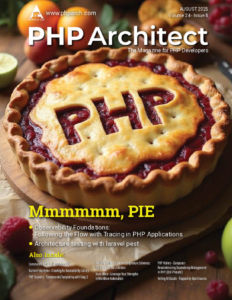In this second article of our workflow series, we explore a fundamental systems thinking principle: leveraging your existing strengths. Using a practical example of configuration management and command generation, we will demonstrate how to build more maintainable workflows by embracing familiar technologies rather than fighting against them. by Edward Barnard
One of the best parts about PHP is how easy it is to extend our code using code that other developers have created. Generally, we experience this by using libraries that other developers have been kind enough to share with us. by Scott Keck-Warren
This article aims to provide a comprehensive overview of Composer, its creation, and its transformative impact on the PHP ecosystem. We will delve into the historical context that led to its development, explore the key milestones in its journey, and examine the critical challenges it addressed in PHP development. By understanding the significance of Composer, we can appreciate how it has revolutionized the way developers manage dependencies and paved the way for modern PHP practices. by Christopher Miller
In 2025, the whole Open Source Software concept seems to be wobbling. I’d even go as far as to say that there has never been a worse time to be someone maintaining and contributing to an Open Source project. This month, I want to talk about my own experiences with Open Source Software and maybe where the whole idea is headed. by Chris Hartjes
Over the past few months, we’ve built a foundation in modern cryptography, starting with Diffie-Hellman Key Exchange, progressing through Elliptic Curve Diffie-Hellman (ECDH), and exploring digital signatures with ECDSA. Each article demonstrated how cryptographic primitives enable secure communication and verification of authenticity. by Eric Mann
Does PHP need a separate templating language? After all, PHP itself functions as a templating engine? Why introduce another syntax, especially one that might limit front-end developers or force them into cumbersome workarounds? My experience, however, has taught me a crucial lesson: a dedicated template layer with well-defined boundaries is essential for building maintainable and secure web applications. It streamlines display logic, enforces separation of concerns, and protects against common vulnerabilities. In this article, we’ll dive into Twig 3, a widely-adopted templating engine without peer offering these benefits and more. It’s an excellent addition to any PHP project, new or old. by Oscar Merida
Regardless of the size of your company or development team, often the task of maintaining accessibility is left to just one or two people. This can work just fine, but what happens when that person or persons aren’t available? What happens if they decide to leave for a different team or exit the company altogether? How will you address accessibility in the future? by Maxwell Ivey






Leave a comment
Use the form below to leave a comment: